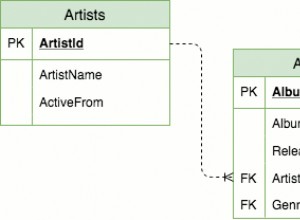È qualcosa di un po' "complicato". La query che stai eseguendo in phpmyadmin è, infatti, corretta. Tuttavia, Laravel usa where() e on() diversamente.
Usa where() con un valore e on() quando si lavora con le colonne.
$times = Time::join(\DB::raw('(SELECT `ath_id`, `stroke_id`, MIN(time) AS time FROM times GROUP BY ath_id, stroke_id) b'), function($join) {
$join->on('times.ath_id', '=', 'b.ath_id')
->on('times.stroke_id', '=', 'b.stroke_id')
->on('times.time', '=', 'b.time');
})
->where('times.ath_id', '=', $id)
->orderBy('times.stroke_id', 'ASC')
->orderBy('times.date', 'DESC');
Documenti:https://laravel.com/docs/5.4/queries , sezione (CTRL+F):Join avanzati
Per essere un po' più chiari:
$join->on('times.ath_id', '=', 'b.auth_id')->where('times.stroke_id', '=','b.stroke_id');
risulta in:
JOIN on `times`.`ath_id` = `b`.`auth_id` WHERE `times`.`stroke_id` = 'b.stroke_id' -- AS STRING
La confusione è arrivata quando toSql() ha restituito la tua richiesta e hai presupposto che Laravel lo sa:
['b.stroke_id', 'b.time', '4298584']
le prime due associazioni di rilegatura sono colonne. Ma where() pensa che siano solo stringhe.




